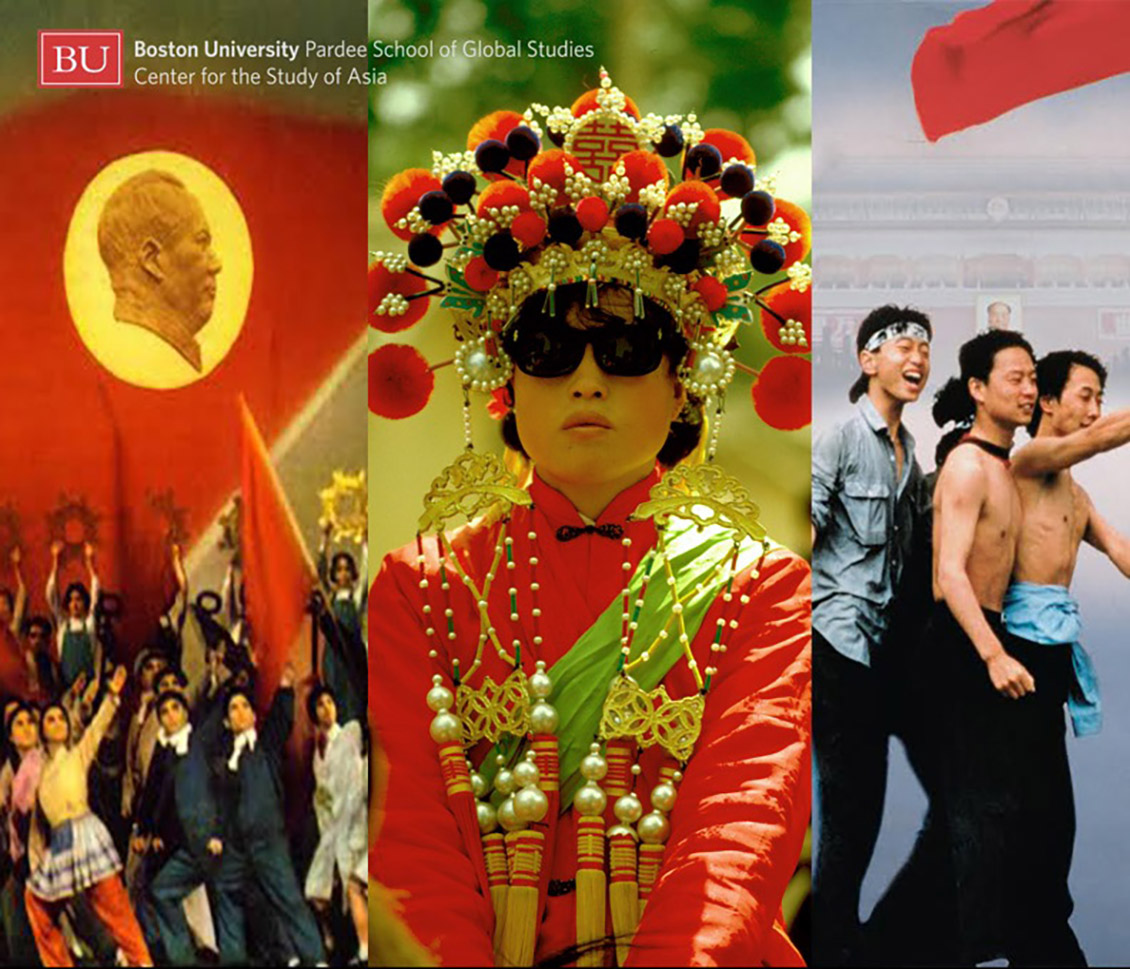History in Images, History in Words: In Search of Facts in Documentary Filmmaking
History in Images, History in Words:
In Search of Facts
in Documentary Filmmaking
A lecture by Carma Hinton
Robinson Professor of Visual Culture and Chinese Studies at George Mason University
Monday April 10, 2017 from 4-7 pm
at the Photonics Center (9th fl.), 8 St. Mary’s Street, Boston University
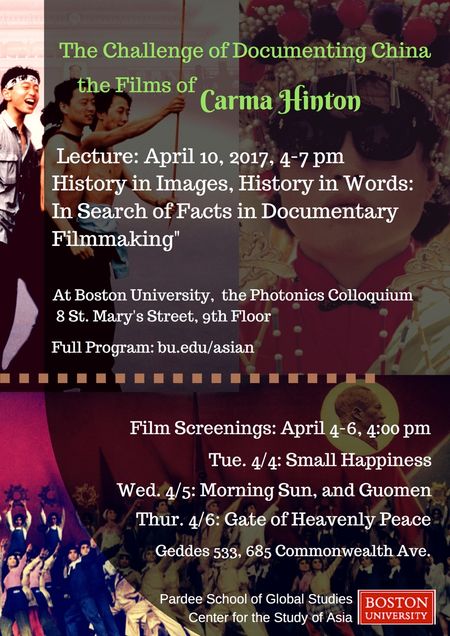 My presentation will focus on the process of documentary filmmaking, especially the many challenges my team and I faced in trying to create engaging filmic narratives that are both factually accurate and encompass multiple perspectives. I will use excerpts from my films as well as out-takes to illustrate the difficulties in determining what information to include and exclude, assess the compromises involved in the choices, and explore the consequences of taking various possible paths. I will also address the different problems that a historian encounters when presenting history in images as opposed to in words: the potential and limitation of each medium and what information each might privilege or obscure. I believe that in this age of “alternative facts” and “parallel universes,” reflections on the challenges in obtaining authenticity and truth and the importance of relentlessly striving to reach this goal, take on particularly urgent meaning.
My presentation will focus on the process of documentary filmmaking, especially the many challenges my team and I faced in trying to create engaging filmic narratives that are both factually accurate and encompass multiple perspectives. I will use excerpts from my films as well as out-takes to illustrate the difficulties in determining what information to include and exclude, assess the compromises involved in the choices, and explore the consequences of taking various possible paths. I will also address the different problems that a historian encounters when presenting history in images as opposed to in words: the potential and limitation of each medium and what information each might privilege or obscure. I believe that in this age of “alternative facts” and “parallel universes,” reflections on the challenges in obtaining authenticity and truth and the importance of relentlessly striving to reach this goal, take on particularly urgent meaning.
About the speaker:
Carma Hinton is an art historian and a filmmaker. She received her Ph.D. in Art History from Harvard University and is now Robinson Professor of Visual Culture and Chinese Studies at George Mason University. Together with Richard Gordon, Hinton has directed many documentary films, including Small Happiness, All Under Heaven, To Taste a Hundred Herbs, Abode of Illusion: The Life and Art of Chang Dai-chien, The Gate of Heavenly Peace, and Morning Sun. She has won two Peabody Awards, the American Historical Association’s John E. O’Connor Film Award, the International Critics Prize and the Best Social and Political Documentary at the Banff Television Festival, and a National News & Documentary Emmy, among others. Hinton is currently working on a book about Chinese scrolls depicting the theme of demon quelling. Carma Hinton was born in Beijing. Chinese is her first language and culture.

Career Paths in Cultural Heritage Management: A Conversation with Helena Arose (The Antiquities Coalition, Wash. DC) (Monday Apr. 8 2024)

About the Speaker:
![]() Helena Arose serves as the Director of Programs at the Antiquities Coalition. In this role, she closely collaborates with representatives from the U.S. and international governments, law enforcement agencies, international partners, academics, and other key stakeholder groups to develop and implement programs to fight the illicit trade in ancient art and antiquities.
Helena Arose serves as the Director of Programs at the Antiquities Coalition. In this role, she closely collaborates with representatives from the U.S. and international governments, law enforcement agencies, international partners, academics, and other key stakeholder groups to develop and implement programs to fight the illicit trade in ancient art and antiquities.
Helena plays a critical role in advancing the AC’s mission by leading key research projects and publications, and also developing and managing popular online educational resources including interactive maps, timelines, and campaigns. She has organized and coordinated both in-person and virtual programs with world-renowned experts on topics pertaining to antiquities and cultural heritage. In addition, she helps edit and publish the Antiquities Coalition’s award-winning Think Tank Policy Brief series.
Helena conducts in-depth research on antiquities looting and trafficking, cultural heritage diplomacy and protection, and financial crimes and the art market. In addition, she has authored several publications for the AC and academic outlets. She also serves as an expert on topics related to cultural racketeering, speaking widely on these issues for academic, government, and general audiences.
Prior to this role, Helena served as Research Associate and Project Director at the AC. Before joining the organization, Helena worked as a Collections Specialist for the City of Raleigh Historic Resources and Museum Program, where she gained experience working in museums and collections.
Helena graduated from the University of Glasgow in 2018 with a MSc in Art History: Collecting and Provenance in an International Context. An archaeologist by training, she holds a BA in Archaeology from Johns Hopkins University, and has participated in archaeological excavations in Athienou, Cyprus, and in North Carolina.
About the Antiquities Coalition: https://theantiquitiescoalition.org/
Welcome from the Chairman
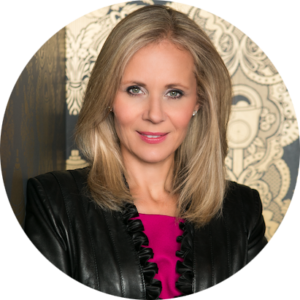
On behalf of our entire team—and the communities and countries we work to support—we sincerely thank you for joining the Antiquities Coalition in our mission to safeguard the world’s heritage from cultural racketeering.
Today, no culture with a past worth protecting is safe from tomb raiders and art smugglers. This illicit trade is a threat not just to our shared history, but to human rights, national economies, and global security. But while the problem is immense, so, too, are the possible solutions.
We are proud to lead a global campaign against cultural racketeering. We champion better law and policy, foster diplomatic cooperation, and advance other proven solutions in partnership with governments, market leaders, and local communities. With your help, we will realize a future in which the past is preserved for the next generation—not looted, smuggled, and sold to finance crime, conflict, and terror.
We thank you again and invite you to browse our website to learn more about our work.
Sincerely,

Deborah Lehr
Our Mission
To protect our shared heritage and global security, the Antiquities Coalition is leading the international campaign against cultural racketeering, the illicit trade in ancient art and artifacts. We champion better law and policy, foster diplomatic cooperation, and advance proven solutions with public and private partners worldwide. We are working towards a future when the past is preserved for the next generation, not looted, smuggled, and sold to finance crime, conflict, and terror.
Our Values
The Antiquities Coalition is guided by core values that serve as the foundation of our organizational culture and practice, guiding our Board of Directors, Advisory Council, and staff as we work to achieve our mission.
We believe:
- Antiquities and the ancient sites from which they come are irreplaceable resources. They serve as a tangible link to our culture, history, and environment, helping us to understand who we are, who we have been, and who we may become. While they hold different value to different peoples, they predate many of the modern world’s political, economic, and religious differences, and thus unite rather than divide us.
- This shared heritage is being destroyed by cultural racketeering, the looting and trafficking of antiquities, to feed the growing market for ancient art. The illicit trade is robbing future generations of their past. It is also a threat to economic and national security, as it is closely linked to the financing of organized crime, armed conflict, and violent extremism.
- Terrorist organizations are additionally using heritage as a weapon of war, through ideological and intentional cultural destruction. This is an atrocity crime in itself, as well as a warning sign of impending war crimes, crimes against humanity, and genocide.
- Responsible cultural exchange can fight these threats by fostering mutual understanding, appreciation, and respect among peoples and nations. The lawful and ethical collection and trade in antiquities can do the same, so long as it does not harm local communities, disrupt the historical record, or fund crime, conflict, or violent extremism. Repatriation can also serve as a bridge between cultures, and moreover, an opportunity to right past wrongs.
- Cultural heritage is inseparable from individual and community identity. Access to it is a fundamental human right, necessitating the protection and preservation of antiquities and historical sites. The intentional destruction of cultural heritage is a violation of human rights.
- Cultural heritage is a fundamental source of innovation, creativity, and development. Responsible tourism can promote sustainable economic growth and is an important component of the fight against poverty.
- Nations must safeguard cultural heritage within their borders, holding it in trust for their citizens and those of the world, while also honoring the cultural heritage of other nations.
- We believe in the universality of this mission and that everyone has a role to play.
Beauty Regimes: A History of Power and Modern Empire in the Philippines, 1898-1941, with Genevieve Clutario (April 10, 2024)

Today!! Join us for the BUCSA Asian Studies Spring Reception! (Thursday, Apr. 11, 2024)

The Lake of Fire: Sacred Waters in an Era of Climate Apocalypse, with Tulasi Srinivas (Apr. 17, 2024)
When a sacred lake bursts into toxic flames, and the temple at its shore is charred, the resident goddess flees. Where can She go? This talk highlights the paradox between Hinduism's view of water as female, sacred and sentient, and the endemic pollution of water resources and climate-driven drought in contemporary India, and considers the existential ethics at stake in apocalyptic climate change. It focuses on female poetics of care to think about indigenous Dalit well-diggers' knowledge of water, and caste legacy knowledge in general. Focusing upon the examination of water as a gendered sacred trope, it illuminates the complex interplay between caste, sexual difference, and the ethical demands of anthropology, floating towards the possibility of a feminist critical Hindu theology as a reparation of the climate crisis in India.
The Lake of Fire: Sacred Waters in an Era of Climate Apocalypse in India
Tulasi Srinivas (Emerson College)
Wednesday, April 17, 2024 from 5:00 to 6:30 pm
Pardee School of Global Studies, 121 Bay State Road, Boston, MA

About the speaker:
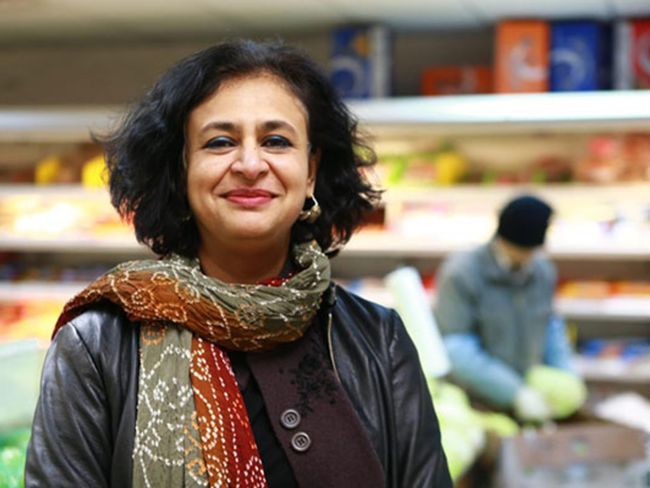 Tulasi Srinivas is Professor of Anthropology, Religion and Transnational Studies at the Marlboro Institute for Interdisciplinary Studies at Emerson College. She is a recognized scholar of religion and ecology with a focus on climate justice.
Tulasi Srinivas is Professor of Anthropology, Religion and Transnational Studies at the Marlboro Institute for Interdisciplinary Studies at Emerson College. She is a recognized scholar of religion and ecology with a focus on climate justice.
Literature and Thought in Transwar Japan, with Brian Hurley (U Texas) (Apr. 18, 2024)
How do we read an idea when it appears in the literary form of a novel, poem, or translation, rather than in the expository form of philosophy per se? Brian Hurley's 2022 book Confluence and Conflict: Reading Transwar Japanese Literature and Thought thinks through this question by tracing the connections between the realms of literature and thought in 20th century Japan that have more often been held apart by the disciplinary divisions of our academy today.
The BU Center for the Humanities, Center for the Study of Asia, and Dept. of World Languages and Literatures present
Brian Hurley
(Dept. of Asian Studies, Univ. of Texas-Austin)
Literature and Thought in Transwar Japan
Thursday, April 18, 2024 at 5:00 pm
in CAS 228 (725 Commonwealth Ave., Boston University, Boston, MA)

Abstract:
How do we read an idea when it appears in the literary form of a novel, poem, or translation, rather than in the expository form of philosophy per se? My 2022 book Confluence and Conflict: Reading Transwar Japanese Literature and Thought thinks through this question by tracing the connections between the realms of literature and thought in 20th century Japan that have more often been held apart by the disciplinary divisions of our academy today.
The book puts the sensuous realm of literature into dialogue with the cerebral realm of thought in contexts ranging from the middlebrow novelist Tanizaki Jun’cihirō’s modern translation of The Tale of Genji (Genji monogatari) and the avant-garde modernist Yokomitsu Riichi’s legendary novel of ideas The Melancholy of Travel (Ryoshū) to the poet Nakano Shigeharu’s Marxist interpretation of everyday language and the culture of postwar liberalism that surrounded the scholar Edwin McClellan as he translated Natsume Sōseki’s classic novel Kokoro in 1950s America. Through these studies, the book constructs a framework for connecting prewar and postwar history by reading Japan’s turn to nationalism and fascism during the interwar years in transwar conversation with the reconstruction of liberal sentiments in the postwar period that followed.
As this book talk outlines the structure and content of Confluence and Conflict, it will also point to how writing the book planted the seeds that have grown into more recent projects related to literature and thought in other contexts. These projects include studies of the literary dimension of the conservative mind, the aesthetic critique of Cold War capitalism, and the transpacific life of Edgar Rice Burroughs’ iconic literary hero Tarzan during World War II.
About the Speaker:
 Brian Hurley is Assistant Professor in the Department of Asian Studies at the University of Texas at Austin. His book Confluence and Conflict: Reading Transwar Japanese Literature and Thought (Harvard University Asia Center, 2022) received honorable mention in the Aldo and Jeanne Scaglione Book Prize for East Asian Studies presented by the Modern Language Association. It was also named a finalist in the Modern Japan History Association’s Book Prize competition. His most recent scholarship appears in articles to be published in 2024 in Comparative Literature Studies, The Journal of Asian Studies, Japanese Language and Literature, and positions: asia critique.
Brian Hurley is Assistant Professor in the Department of Asian Studies at the University of Texas at Austin. His book Confluence and Conflict: Reading Transwar Japanese Literature and Thought (Harvard University Asia Center, 2022) received honorable mention in the Aldo and Jeanne Scaglione Book Prize for East Asian Studies presented by the Modern Language Association. It was also named a finalist in the Modern Japan History Association’s Book Prize competition. His most recent scholarship appears in articles to be published in 2024 in Comparative Literature Studies, The Journal of Asian Studies, Japanese Language and Literature, and positions: asia critique.
Author and Translator Reading and Translation Discussion of “Nails and Eyes” with Kaori Fujino and Kendall Heitzman (Apr. 22, 2024)
The Japan Foundation New York and the University of Iowa’s Center for Asian and Pacific Studies join local co-sponsors BU Center for the Humanities, the Program in Women’s Gender, and Sexuality Studies, the Department of World Languages and Literature, Center for Teaching and Learning and BU Center for the Study of Asia.
Kaori Fujino (Author) & Kendall Heitzman (Translator)
Author and Translator Reading and Translation Discussion: "Nails and Eyes"
Monday, April 22, 2024 5:30 PM-7 PM
Pardee School of Global Studies, 121 Bay State Road, Boston MA
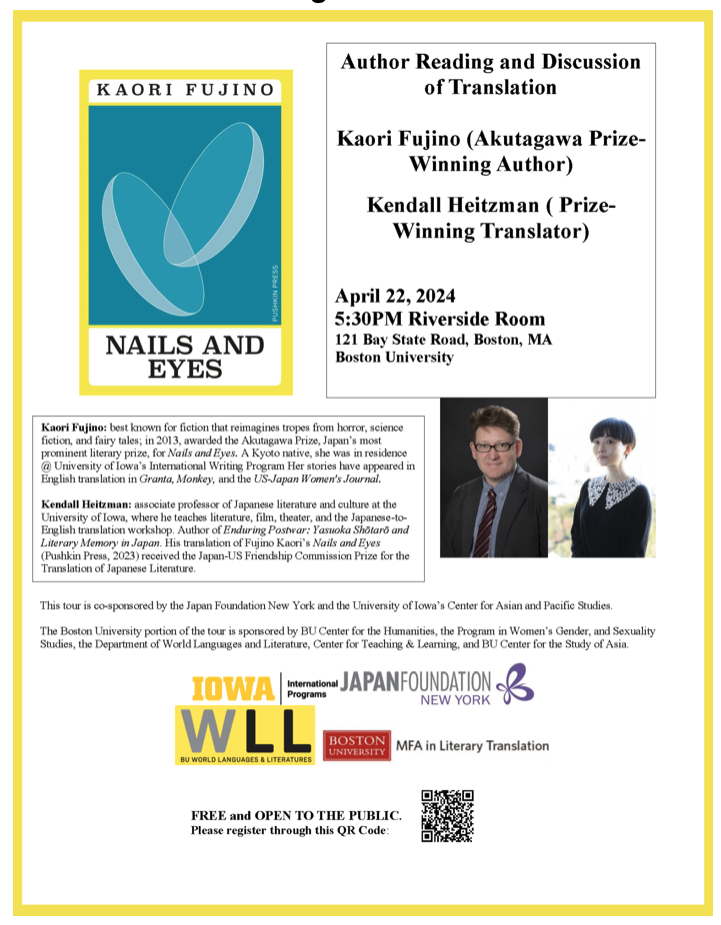
Register here
Moving Ink: An Exploration of Chinese Calligraphy, with Wen-hao Tien (photos from the Dec. 1 event)
On December 1st, 2023, students immersed themselves in "Moving Ink: An Exploration of Chinese Calligraphy," a workshop led by interdisciplinary artist and educator Wen-hao Tien. Approximately 40 students participated in this event. The session seamlessly blended tradition with contemporary expression, offering participants a unique chance to delve into the nuances of this ancient art form. Ms. Tien began the workshop by leading a choreography of movements that mimic calligraphy strokes. She emphasized how mindfulness movement similar to Taichi is center to this practice. The event becomes a collective journey of discovery as participants share insights, techniques, and celebrate the uniqueness of their creations.
Moving Ink:
An Exploration of Chinese Calligraphy
Friday, Dec. 1, 2023 from 3:30-4:45 pm
at CDS B62, 665 Commonwealth Avenue, Boston University

Here are some photos of artist Wen-hao Tien leading a large group of enthusiastic students in an exploration of movement and calligraphy!

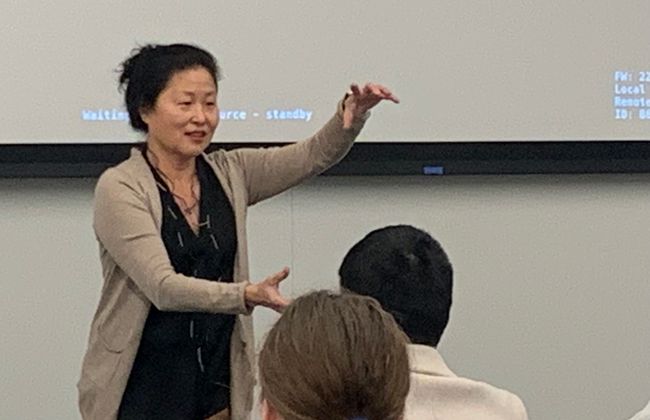

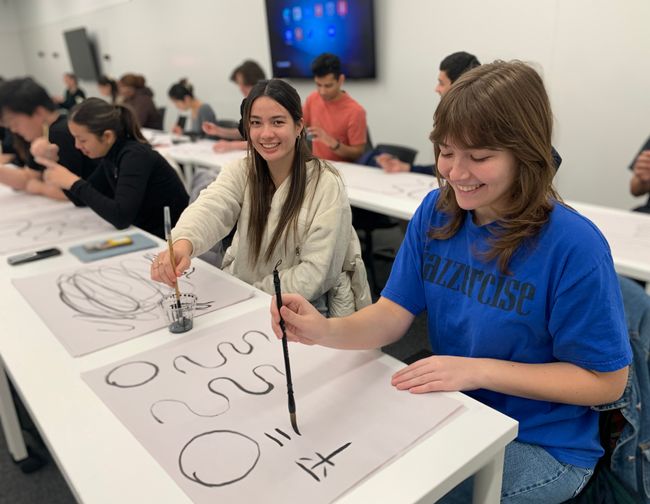
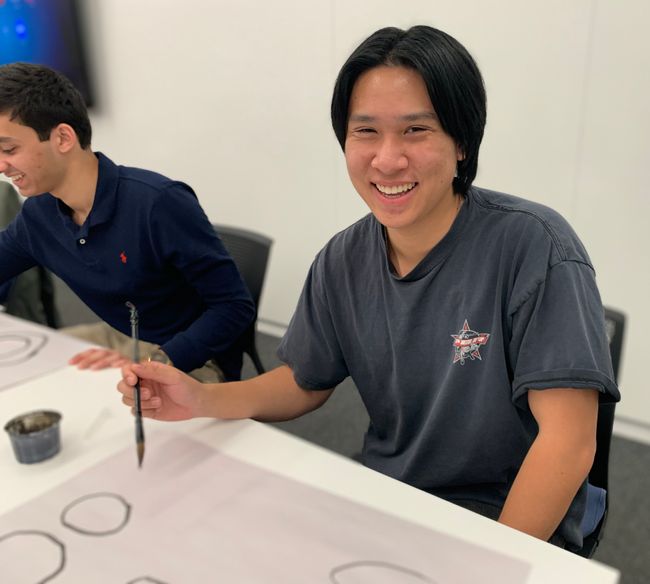
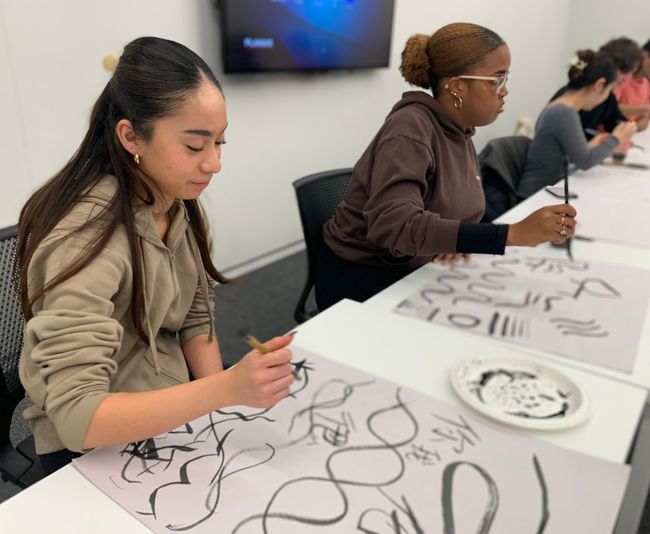
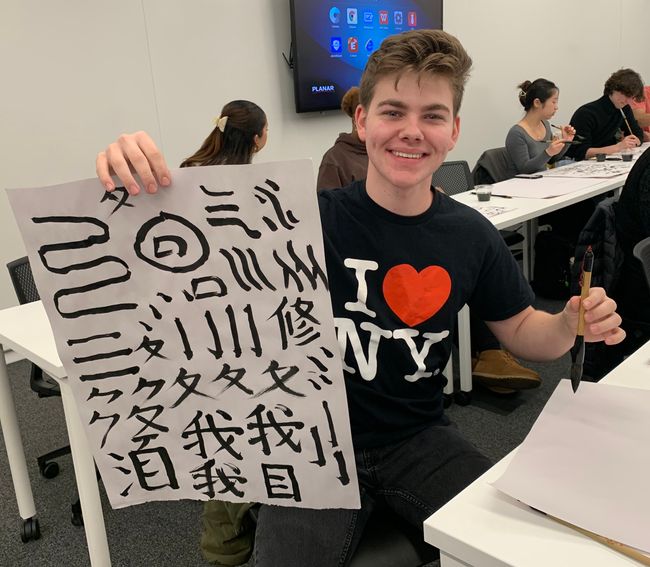




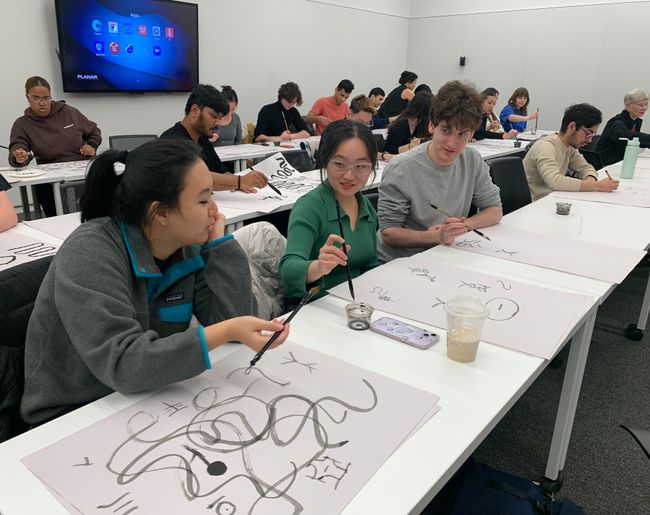
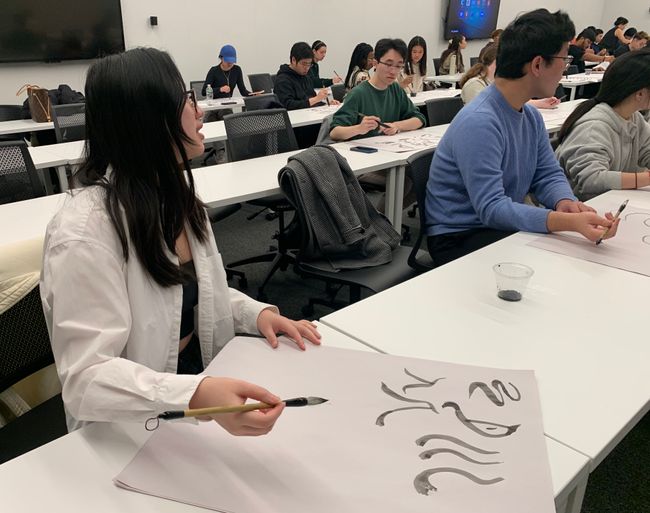
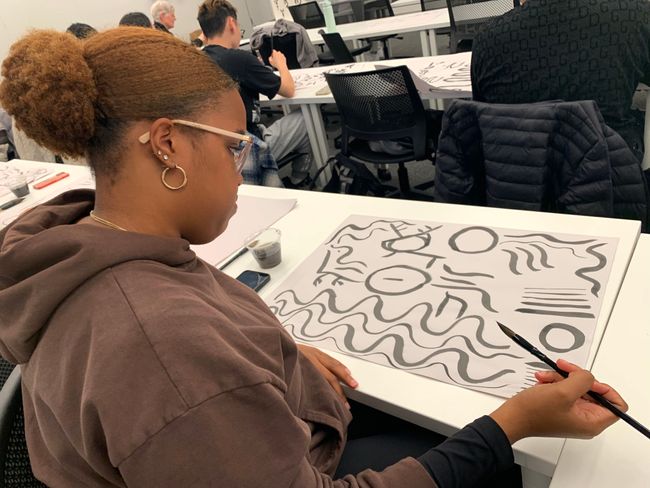
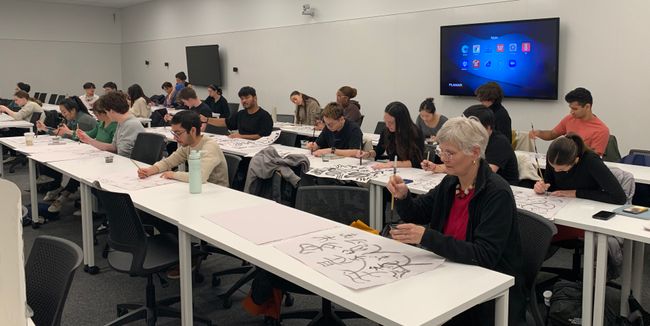
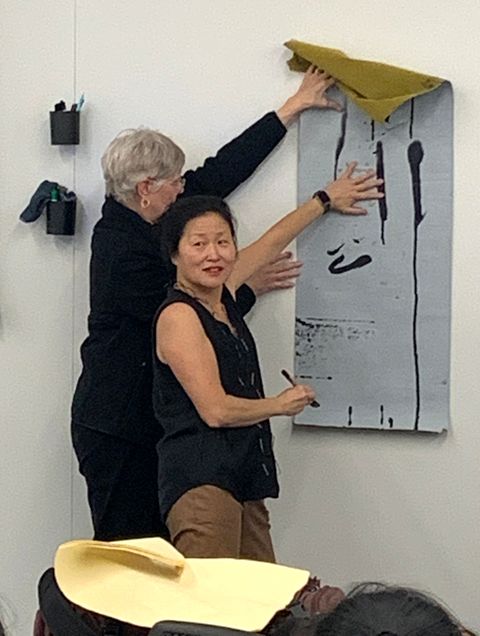
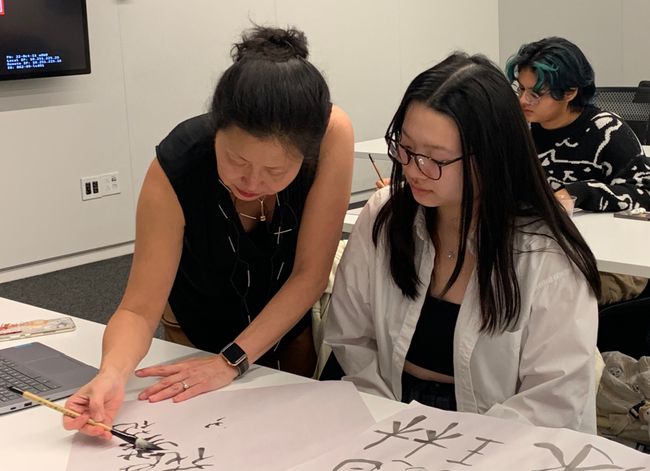
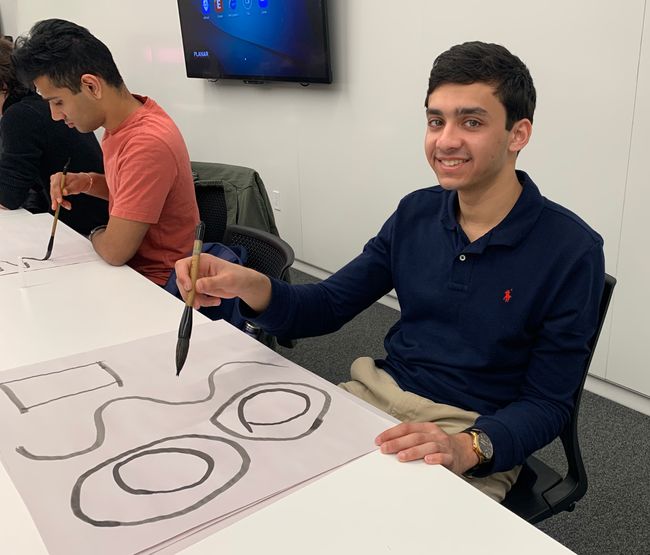
Asian Cultural Council Fellowships & Grants 2024 Overview (Applications accepted November 1 – 30, 2023)
Asian Cultural Council 2024 Grant Overview
The Asian Cultural Council is committed to advancing international dialogue, mutual understanding, and respect through supporting cultural exchange projects by individuals and organizations between Asia and the US and between Asian countries.
For full details of the various ACC grant programs, see https://www.asianculturalcouncil.org/our-work/programs/fellowships-and-grants
ACC grants provide long-term, immersive exploration of other cultures. ACC’s individualized programmatic support expands the horizons of grantees by nurturing their perspectives, fostering creative growth, and fostering valuable international connections.
ACC values long-lasting relationships with our grantees. We partner with them and help them form communities to share their transformative experiences and cultivate valuable international connections.
ACC grants go beyond mere travel funding; they offer a unique opportunity for recipients to design an experience individually and fully immerse themselves in a different culture.
ACC takes an unconventional approach by not funding production-based grants, such as the creation of artwork or an exhibition. Instead, our Fellowships and grants seek to provide cultural enrichment opportunities for selected grantees. We have found that through funding a period spent in an unfamiliar environment where grantees can take a break from their day-to-day responsibilities and deadlines, they are more open to expanding their perspectives and integrating learned experiences into their creative practices.
Accordingly, ACC has developed four distinct grant types to support immersive cultural exchange:
- New York Fellowship
- Individual Fellowship
- Graduate Fellowship
- Organization Grant
Please read the guidelines carefully to determine your eligibility and identify which grant can best support your needs. Please note you are only able to apply for one type of grant during the 2024 grant cycle.
Asian Cultural Council recognizes that the arts have become increasingly intersectional with the rapid advancement of technological innovations. For the 2024 grant cycle, proposals that focus on the relationship between the arts, technology, and culture are encouraged.
We seek artists and cultural creators who demonstrate a dedication to their ongoing artistic and professional growth. Applicants should articulate their goals, strategies, and plans for advancing their artistic careers, including how a Fellowship will support their development.
The 2024 grant cycle is a global open call. ACC will accept applications from individuals and organizations based in Asia and the United States. Applicants are asked to provide one letter of recommendation, as well as contact information (name, email, and phone number) for two additional professional references. All applications will be reviewed by selection committees consisting of regional, national, and international field experts. For a detailed list of countries, please click here: eligible country / region. For a detailed list of disciplines, please click here: eligible field.
Please note that ACC’s next grant cycle will open in the fall of 2024 and will be open to residents of qualified Asia grantees only.
Applicants from Japan and Taiwan ROC are required to complete a separate local language application. Applicants from Hong Kong SAR, Macau SAR, and Mainland China have the option to complete a separate local language application. Please refer to the Instructions page on the application portal for more information.
Moving Bones: The Repatriation of Human Remains in Late Qing as a Historical and Cultural Phenomenon (Washington Univ-St. Louis, Nov. 9, 2023)
Moving Bones: The Repatriation of Human Remains in Late Qing as a Historical and Cultural Phenomenon
Elizabeth Sinn
Honourary Professor at Hong Kong University
Thursday, Nov. 9, 2023 at 8:00 pm ET (via Zoom)

To be buried in one’s home village, like fallen leaves returning to their roots, was a long-held ideal in China. For centuries, returning for burial the remains of deceased sojourners including officials, merchants and candidates of the civil service examination, was an aspiration put in practice whenever possible. With expanding Chinese migration overseas in the 19th century, tens of thousands of coffins, bone boxes and spirit boxes were returned to China from North and South America, Australia and New Zealand, South East Asia and the Caribbean. The process of returning bones was complex, involving the collaboration of far-flung organizations, administrative mechanisms, knowledge of ritual correctness, long-distance logistics planning, trust, and money. It was an expression of many things – philanthropic impulse, social leadership, love of the native place, filial piety, belief in fengshui, fear of the hungry ghost among them. We may see this moving of the dead as an extraordinary phenomenon in human history given the geographical reach, the volume and frequency, the long duration, and the deep social and cultural meanings attached to it. This lecture will focus on the repatriation activities from California during and after the gold rush and railroad building days. Hong Kong, the entrepot for almost all the bone boxes en route to China, will be highlighted as an “in-between place”, a concept which I offer as a new tool in migration studies.
Elizabeth Sinn is the author of Pacific Crossing: California Gold, Chinese Migration, and the Making of Hong Kong. Before retiring in 2004, she was Deputy Director of the Center of Asian Studies, University of Hong Kong. She is currently an Honourary Professor at the University.
Registration is required to attend the lecture. Once registered you will receive the Zoom link.
Supported by a gift from Leung Tung Peter & Lin Young.
Asian Alumni Forum 2023 (Nov. 3-5 in Shenzhen, China)

The Asian Alumni Forum is a highly anticipated event that brings together BU’s Asian alumni community and provides a platform for interdisciplinary discussions on some of the most pressing issues facing Asian societies today. This exciting weekend serves as a platform for the Asian alumni community to exchange ideas, build connections, and foster business relationships across the continent. Through open dialogues and discussions, alumni can gain a deeper understanding of different perspectives and ideas, which can ultimately lead to more innovative and impactful solutions to the challenges facing our world today.
This year’s topics include environmental, social, & corporate governance (ESG); social network marketing; and development of new consumption industries. Additionally, we will be offering an array of exciting activities for attendees to unwind and connect outside the conference room. Guests will be able to choose from a variety of options, including casual networking receptions; breathtaking sightseeing tours; and immersive local cultural experiences.
For complete details and registration, click here
Boston University Alumni & Friends
595 Commonwealth Avenue, Suite 700 (West Entrance)
Boston, MA 02215
